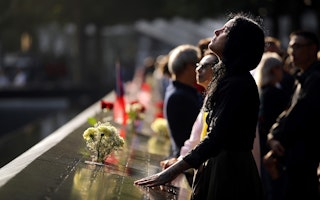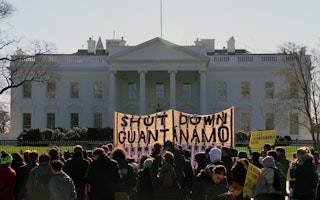You Can’t Bomb Your Way to Peace
By Larry Attree

The global threat from Islamist militancy keeps on spreading. Armed groups have pledged support for ISIS in 19 countries, and the Taliban, al-Shabaab, and al-Qaeda all remain undefeated. Meanwhile, refugees are fleeing conflict in numbers not seen since World War II.
A reboot of the global war on terror could only make things worse.
Despite 15 years of failed efforts to end terrorism and build stability throughout the world, Western nations continue to use air strikes, targeted killings, and military support for regional and local forces to defeat the Islamic State in Iraq and Syria. But the Paris and San Bernardino attacks demonstrate the futility of this strategy.
In three reports released earlier this month, London-based NGO Saferworld concluded that U.S., UK, and EU counterterror, stabilization, and state-building efforts since 2001 in Afghanistan, Somalia, and Yemen have been counterproductive. In each country, direct force has sometimes pushed back militants, but it has failed to defeat them and secure peace. Violence—especially when indiscriminate and unaccountable—has also harmed civilians, creating greater resentment towards the United States and western governments.
The reports found that a better approach would focus strategically on peace, rely less on the military, take a tougher line on bad governance, and work more closely with civil society.
In Afghanistan, for instance, civilian casualties, drone strikes, and the rendition of Afghans have all created resentment and contributed to renewed support for the Taliban and associated groups. Even though in 2009 and 2010 a “civilian surge” sent more U.S. aid workers and development officers to help stabilize the country, the inability to achieve a political solution undermined the effort. The Taliban continue to rack up military successes, alongside military operations by both ISIS and local militias.
A similar story has unfolded in Yemen, where Saudi air strikes killed some al-Qaeda operatives, but ultimately generated widespread resentment and fed support for anti-Western militants. For example, local media described drone attacks as massacres, jihadi online forums carried pictures of victims’ bodies, and al-Qaeda leaders grieved with victims’ families and accused the United States of waging war against Muslims.
In Somalia, international efforts have focused on defeating al-Shabaab militants. Successive Somali governments have secured considerable military, security, and aid resources from Western organizations, despite extensive corruption and the diversion of weapons into the wrong hands. In 2014, a UN panel accused the Somali government of diverting 70 to 80 percent of funds received and using them to advance “partisan agendas that constitute threats to peace and security.”
Yet it’s exactly this kind of corruption and poor governance—to which the West turns a blind eye—that is the major driver of conflict and violence around the world. By disregarding it, Western actors fall into the “stabilization trap,” trading away long-term success for short-term stability—and ultimately guaranteeing abusive governance, chronic instability, and deep public resentment.
As these examples show, terrorists may not be the worst threat to stability in conflict contexts. Lasting peace in places like Afghanistan, Somalia, and Yemen will prove elusive without facing up to the cynicism and abuse of supposed partners.
Saferworld is a grantee of the Open Society Foundations.
Larry Attree is head of policy at Saferworld.


